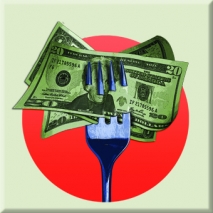I am going to talk about giving money to “poor people”; and about the massive architecture of helping that we continue to build, in part because we do not want to give money to people living on a low income. The titles of two recent articles by the Toronto Star reporter Ed Keenan outline what is at stake: “Shutting food bank first step in program to add respect to feeding hungry;” and, “Food-bank system’s absurd, but it shows we don’t lack for helpers.” Since I started this post, the CBC has also weighed in (at the bottom of this post).
In many ways Keenan is right, though I aim to complicate his arguments as much as possible. I also aim to complicate his conclusion, which is that we should simply give money to folks who are struggling. Yes, it seems that money translates into more choice which translates into more freedom, but giving people money does not obviously affect the environment in which people must choose, and in which poor people must often “choose” between different terrible options. Closing down food banks will not make these choices better, or more accessible, but neither, unfortunately, will cash-instead-of-food. This piece is part one of three.
Food banking is undignified and inefficient
In the first of Keenan’s two articles, he visits Food for Friends, which is a program in Woodstock, Ontario that replaced a food bank. Food for Friends gives community members gift cards funded by donations at grocery store cash registers. Recipients can use the cards at any grocery store in the community on non-taxable, i.e. staple food items. Keenan focuses on how gift cards differ from waiting in line at a food bank:
Wendy Oldham has received help from Food for Friends since it began, and agrees it is more dignified. “What I like, is you can get your cart and go up and down the aisles, picking the things you like, just like normal people.” Her phrasing suggests the shift in perspective: being handed a box of food sorted and chosen by other people makes recipients feel like they aren’t normal people.
In the other article Keenan digs a bit deeper, and questions the basic food banking premise:
If my neighbour can’t afford a can of soup, I could just give him 99 cents to buy one from the store at the end of our street.
Or I could go to that store myself, buy a can of soup and then take it to a donation drop-off point, where a truck will pick it up and take it to a warehouse in Etobicoke, where it will be sorted and stored until it is packed back into a truck and sent to a local food-bank location, where it will be unpacked and sorted and shelved and then later put into a basket that my neighbour can pick up at some point and bring home.
Keenan has plenty of good things to say about the positively well-intentioned, large-hearted individuals who work or volunteer at food banks. However, I am interested in his two separate but vital criticisms of food banking in general.
Keenan’s first point is that food banks are inefficient.
His second point is that food banks are paternalistic.
That being the case, he argues, we should give money instead of food. Cash transfers are not, or are at least less paternalistic. Money is freedom through choice. And cash transfers are more efficient. No trucks, no warehouses, no volunteers sorting rotten potatoes.
Is he right? Part two, coming soon!



